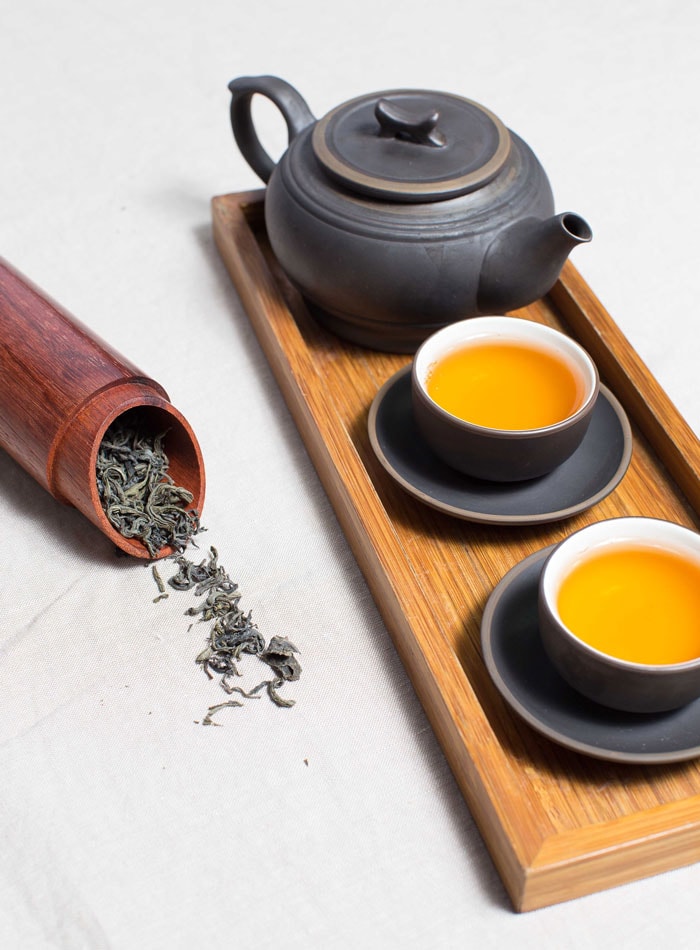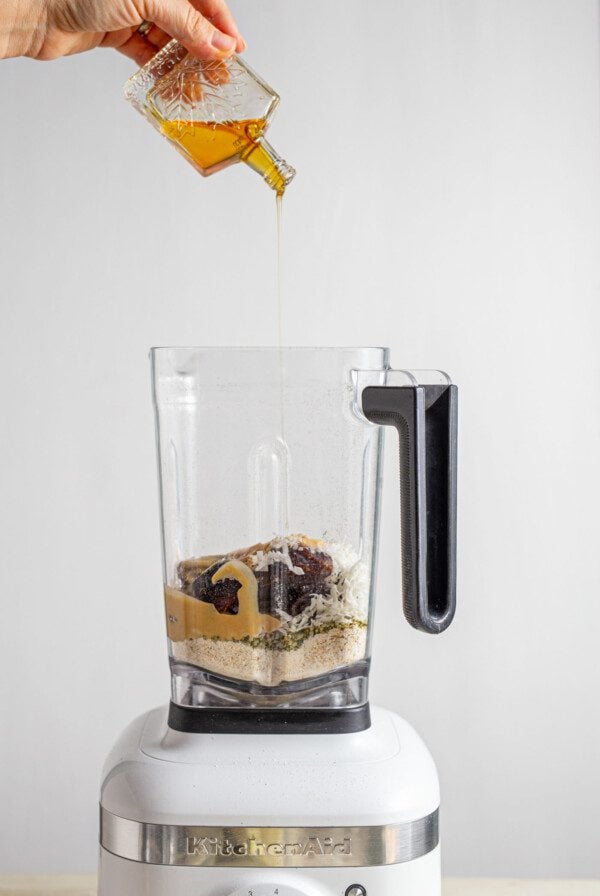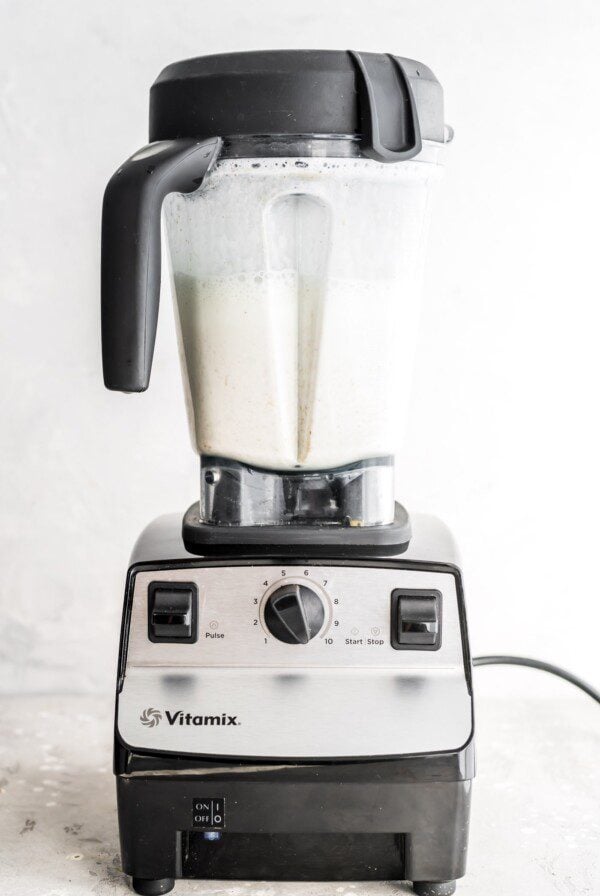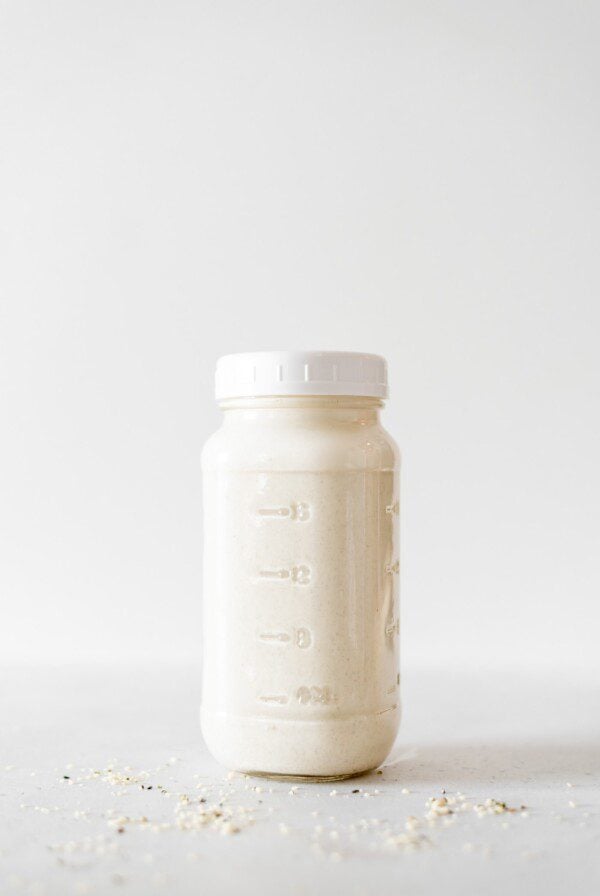All About Adaptogens and Their Benefits
on Nov 16, 2017, Updated Oct 04, 2023
This post may contain affiliate links.
Maca, eleuthero, ashwaganda, astragalus, ginseng…I’m sure most of you have heard of adaptogens. They’ve been used for thousands of years but have seen a big rise in popularity over the last few years as the latest healthy living trend. But what are adaptogens? Well, adaptogenic herbs are natural substances that help the body adapt to stress by regulating important hormones in the body. Today we’re learn all about adaptogens, from holy basil to rhodiola and more.
Adaptogens can help to calm you down, boost your energy levels, normalize imbalances and support adrenal function, all of which helps the body counteract the effects of chronic stress. If you’re looking for another natural tool for better sleep, less stress and more energy, adaptogens just might be right for you.

A Better Source of Energy
While people often reach for coffee or sugar when they’re trying to manage stress and fight fatigue, these two substances only offer a quick lift and can be followed by a crash. Luckily, there are other foods we can use to improve energy, reduce stress and normalize hormones. In comes adaptogens.
Adaptogenic herbs are nothing new and have been used in Chinese and Indian medicine for centuries to treat a range of health concerns. The most well-known of adaptogens is probably ginseng but others adaptogens include holy basil, ashwaganda, astralagus, milk thistle, maca, eleuthero and bacopa. We’re going to take a look at what exactly adaptogens are, how they work, who should take them and the the health benefits of the ones most commonly used.
What are Adaptogens?
The term “adaptogen” was given a formal definition in 1968, by Lazarevs colleagues Israel Brekhman and I.V. Dardymov and was defined as follows:
- An adaptogen is nontoxic to the recipient.
- An adaptogen produces a nonspecific response in the body an increase in the power of resistance against multiple stressors including physical, chemical, or biological agents
- An adaptogen has a normalizing influence on physiology, irrespective of the direction of change from physiological norms caused by the stressor.
In other words, an adaptogen is a safe, plant-based substance that reduces the body’s response to stress and supports overall overall health by normalizing the body. Andrew Weil, MD, describes adaptogens as herbs “that can ‘tone’ the body and bring it back to homeostasis,” creating a non-specific response that helps it resist stress.
How do Adaptogens Work?
Stress, or that “fight or flight” mechanism, is evolutionally only meant to exist in short bursts. Unfortunately many modern-day stresses have become constant and when the adrenal system remains constantly active, the body is thrown out of balance.
Constant elevated stress levels can negatively affect everything from the digestive system to our energy levels. Adaptogens help to bring our hormones back into balance to reduce adrenal fatigue. They can also give us a boost in times of low energy.
Overall Benefits of Adaptogens
Here is a general list of some of the health benefits you can experience from adding various adaptogens to your diet:
- reduced inflammation
- reduced fatigue
- immune support
- liver and heart health protection
- alleviation of depression and anxiety
- balanced hormones such as cortisol
- cancer-fighting
- reduced cholesterol levels
- improved sleep
- more energy
Who Should Take Adaptogens?
Due to the level of stress that impacts us today, I would say most people could benefit from taking one, or a combination of adaptogens. That being said, it’s important to take a holistic approach to reducing your stress levels and not rely on any one pill or supplement.
Try to find ways to de-stress that work for you. For me, it’s the gym, walking my dogs, meditation, journalling, getting plenty of quality sleep, spending time with friends and family and practicing self-care whenever possible. Those stress-reduction methods combined with adaptogens, a whole food diet, exercise, plenty of water and a focus on mindset and mental health helps keep my stress levels in check.
Ditch Unnecessary Stress
Sometimes the stress we experience if out of our control. Some big stressors in life are just unavoidable, things like moving, a change in jobs, illness or the death of a loved one. Adaptogens can be very beneficial during times of high-stress we can’t do much about.
However, some stressors in our lives can be minimized or eliminated altogether, things like dehydration, a poor diet and an unhealthy lifestyle. By being conscious of our lifestyle choices and reducing our exposure to environmental stressors such as toxins in our food, we can greatly reduce the stress in our lives and naturally feel better, sleep better and have more energy.
Take a Holistic Approach
For adaptogens to really work, it’s important to take a holistic approach to your health. If you’re using adaptogens to help with adrenal fatigue, some key factors that can help increase then effectiveness are:
- Going to bed early and getting enough sleep. Staying up too late can throw cortisol and other hormones out of balance. Read my Tips for Better Sleep.
- Reducing or eliminate your caffeine intake. Caffeine taxes the adrenals and overuse can cause adrenal fatigue and a host of other issues. Try to drink lower caffeine beverages like green tea, Dandy Blend, Four Sigmatic Elixirs or herbal tea.
- Reduce your sugar intake. Eating too much sugar causes spikes and crashes in blood sugar levels which wreak havoc on our hormones.
- Calm down. Eliminate unnecessary stress and find ways to cope with stressful situations you can’t avoid.
- Get plenty of gently exercise. Walking, yoga, swimming and jogging are great choices for getting active without causing adrenal fatigue.
- Promote healthy digestion. Eat slowly and in a calm manner, include fermented foods, take a probiotic, reduce sodium intake and ditch processed foods.
- Eating a whole food-based diet. Adaptogens won’t be able to do their job if they’re not being used in combination with a healthy, balanced, whole food diet. Start there and then add adaptogens depending on your needs.

How to Take Adaptogens
Adaptogens come in many different forms but they’re most commonly found as pills, powders or teas. There’s no one right way to take them so it’s just a matter of personal preference. A lot of people find it easy to take them in capsule form or use a powder and blend it into a smoothie or homemade latte-style drink like my golden milk.
My favourite way to use them is in elxir-latte-style drinks such as reishi and chaga with cacao and warm almond milk for a healthy evening drink or vanilla protein with coffee, MCT oil and ashwaganda. Check out my Vegan Bulletproof Coffee for ideas on creating these delicious, frothy drinks.
Adaptogens are also slow-acting so although they’re powerful, you may not notice their effects for a few weeks after you start taking them, depending on which one you’re using.
It’s important to note that adaptogens don’t work on any one condition of the body but rather help to strengthen our bodies as a whole. Adaptogens work to bring the body back into balance and like most healthy habits, are not a quick fix to any one problem.
How to Get Started
Once you choose the adaptogens you think will be most helpful for you and you’re ready to start incorporating it, try taking it every day for about 2 weeks. Take note of your mood and how you feel during this time. If you haven’t noticed any change after two weeks, discontinue use, evaluate any changes and then either add it back in or try something else.
Adaptogen Dosage
I haven’t included any specific dosages with the list of adaptogens below so it may be helpful to work wtih a natural health practitioner to tailor a specific combination of adaptogens for you and their dosage.
Taking Breaks from Adaptogens
Adaptogens are powerful. Sun Potion recommends they be consumed in small amounts over time, incorporating them into your routine throughout the week, in addition Gaia Herbs recommends the following rule of thumb:
“If an extract is to be used for more than 1 week, then take 6 days on and 1 day off. If an extract is used for more than 6 weeks, then take 6 weeks on and 1 week off, with a day off each week. If an extract is to be used for more than 6 months, then take 6 months on and 1 month off, with a day off each week. The periodic time off from using the herbal extract allows for the full benefit of the herb to be fully integrated into the constitution.”

Benefits of Specific Adaptogens
Adaptogens offer a wide range of benefits so the adaptogens that are best for you might be completely different than the ones that are best for me. Let’s get into the benefits of specific adaptogens and see what they have to offer.
This list isn’t exhaustive but it includes the most commonly used and readily available adaptogenic herbs their benefits.
Ashwaganda: Anxiety, Fatigue and Insomnia
For over 4000 years, Ashwaganda has been a revered herb in Indian Ayurvedic medicine, Ashwaganda is one of the world’s most popular adaptogenic herbs. It helps to restore balance to the body and mind.
Ashwaganda is also a nervine, making it useful for fatigue, mental clarity and anxious feelings. It’s also rich in iron so it can be helpful for anemia or those that eat a plant-based diet.
Ashwaganda Benefits:
- reduces blood sugar levels
- cancer-fighting
- lowers cortisol levels
- reduces stress and anxiety
- helps with stress-related insomnia
- supports immunity system health
- reduces inflammation
- may improve brain function and memory
- increased libido
Rhodiola: Stamina and Endurance
Rhodiola is a versatile and readily available adaptogenic succulent that’s been used for thousands of years in traditional medicine. It’s health benefits have been well-studied. Rhodiola has been used to treat stress and anxiety but it also offers a range of other health benefits such as increased mental stamina and physical endurance, immune support and heart health.
You can find rhodiola in powder, capsule or tea form. I like rhodiola powder so I can add it to smoothies.
Rhodiola Benefits:
- stress relief
- treatment of depression
- boosts cognition and memory
- improved energy levels
- supports heart health
- supports sexual health
- anti-viral
- increased mental stamina and physical endurance
- immune system support
Astragalus: Immunity
Astragalus has a long history as an immunity-booster. The roots of the astragalus plant have been used as an adaptogen in Chinese medicine for thousands of years. Astragalus contains saponins, flavonoids and polysaccharides and between these three compounds astragalus can help to lower cholesterol, prevent and fight cancer, prevent heart disease and reduce inflammation, among other beenfits.
We’ve talked about how dangerous chronic inflammation can be and because of its anti-inflammatory properties, astragalus may be helpful if you’re dealing with symptoms of chronic inflammation.
Astralagus Benefits:
- anti-inflammatory
- supports immune system
- supports a healthy cardiovascular system
- may be effective against diabetes
- anti-aging and disease-fighting antioxidants
- may help heal wounds and acute inflammation
- natural cold and flu remedy
Cordyceps Mushroom: Anti-Aging and Performance
Being an athlete, cordyceps is one of my favourite adaptogens. I’ll use it during a particularly hard week of training or when I feel a cold coming on. Cordyceps is a type of fungus and has been used throughout history for it’s longevity-promoting benefits. Cordyceps has also been used to help fight infections, inflammation and disease, increase energy levels and fight the effects of aging and stress.
Cordyceps was once quite rare but is now readily available in capsules and powders. If you’re taking cordyceps for it’s disease-fighting and immunity benefits, you can use it once or twice a week, or simply in times of high stress. If it’s being used to treat a specific condition, consult with a health care practitioner for the appropriate dosage.
Cordyceps Benefits:
- anti-inflammatory
- fights stress and fatigue
- natural energy booster
- increase immune function
- improved stamina and athletic performance
- promotes longevity
- enhanced libido
- supports a healthy liver and detoxification

Chaga Mushroom: Fighting Disease
Chaga has been consumed for centuries in Eastern cultures for it’s immune-strengthening properties. The chaga mushroom is very high in antioxidants making it a potent disease-fighter.
Chaga is easily obtained in capsule, tablet or powder forms. This chaga extract powder is also easy to blend into smoothies, coffee and other drinks.
Chaga Benefits:
- disease-fighting antioxidants
- anti-inflammatory
- may improve physical endurance
- cancer fighting
- anti-viral
Chaga Mushroom Tea
I also like using whole chaga to make chaga mushroom tea in my slow cooker. It’s fantastic and makes a wonderful substitute for coffee. Simply add water and a handful of chunks of chaga mushroom to your slow cooker and cook on low for 6-8 hours. Once it’s done, you’ll have a rich, dark tea you can enjoy hot or cold that can be stored in the fridge for a couple weeks.
Reishi Mushroom: Sleep and Relaxation
Reishi mushroom is another one of my favourites and it’s my go-to for relaxing in the evenings and promoting quality sleep. The reishi mushroom has been used for thousands of years an is a strongly anti-inflammatory and healing. It’s also tied to longevity, improved immune function and mental clarity.
Reishi has been quite well-studied and the results have demonstrated it’s effectiveness against everything from inflammation, to fatigue, to liver disease, to digestive disorders, to skin and autoimmune disorders, to insomnia, anxiety and depression. Reishi can be taken as as a capsule, tablet, tea or powder.
I also have a recipe for a relaxing, evening Reishi drink, which you can check out here.
Reishi Benefits:
- defend against tumor growth and cancer
- supports liver health and detoxification
- balances hormones for better sleep, more energy and improved concentration and memory
- anti-inflammatory
- fights allergies

Maca: Energy and Balanced Hormones
Maca comes from a Peruvian root and it’s one of my favourite adaptogens. It’s mild, sweet flavour works well in smoothies and elixirs. Maca is rich in nutrients including over 20 amino acids, B vitamins, calcium, magnesium, copper, zinc, iron, potassium and phytonutrients.
Maca can be taken in capsule or powder form. I add maca to everything from oats, to raw energy balls. to smoothies.
Maca Benefits:
- boosts energy and stamina
- promotes feeling of well-being
- calms anxiety
- supports the immune system
- reproductive health
- improved sexual function
- supports hormone health in men and women
Holy Basil:Immunity and Relaxation
Holy basil has been used for thousands of years in Asia and India. Valued for its benefits for the mind, body and spirit, it has been more recently be gaining popularity in North America. It’s a powerful antioxidant with antibacterial, anti-fungal, and anti-inflammatory properties but is more often used for its ability to relieve stress and promote relaxation. Holy basil is a source of vitamin A and C, calcium, zinc, iron and chlorophyll.
People have reported holy basil helps them feel less anxious, stressed and depressed
You can use holy basil in powder form or as herbal tea, which is how I use it. Tulsi tea is affordable, easy to find in stores and comes in a variety of flavours. It’s a wonderful tea that can be enjoyed anytime of day to help balance blood sugar levels, improve brain function and supporting the adrenals.
Holy Basis Benefits:
- powerful antioxidants
- relaxation promoting
- immunity-boosting properties
- cancer-fighting phytochemicals
- improved sleep
- improved focus
- inflammation-fighting

Eleuthero: Immunity and Cognitive Function
Eleuthero has been gaining popularity for its ability to relieve stress, increase cognitive function, lower inflammation and reduce fatigue but those are just a few of its health benefits. It’s a gentle, supportive adaptogen that’s good for every day use, especially for those with highly stressful jobs or who work long hours.
You can take eleuthero as a pill or powder, or you can make a tea from its leaves and roots. Eleuthrero is often prized for its ability to boost energy level, so if you often feel the need to take mid-day naps or feel exhausted, it may be the right adaptogen for you.
It’s also known for its ability to boost metal capacity, helping to improve memory and focus. This makes eleuthero a good choice for students or anyone needing their mental abilities functioning at the highest level.
Eleuthero Benefits:
- anti-inflammatory
- stress relief
- immunity booster
- reduces fatigue by boosting the metabolism and increasing circulation
- boosts mental capacity
- protects heart health
- improves respiratory health
- may help lower blood sugar levels
- improved quality of sleep
- can help speed recovery from acute illness or surgery
Amla: Youthfullness and Memory
Amla, or Indian gooseberry is rich in vitamin C and other antioxidants and is a popular adaptogen believed to have powerful anti-aging and memory-boosting properties. It’s also been used to help restore a healthy appetite, support liver health and promote healthy bones, teeth and hair and a promote a general feeling of wellbeing.
Alma fruit is an important plant in Ayurvedic medicine and has been prized for its health benefits for thousands of years in India. The amla berry is revered in Ayurveda because it’s said to balance all three of the doshas — vata, kapha and pitta and in doing so helps to alleviate the root cause of a range of health issues.
You can consume Indian Gooseberry, or amla as fresh fruit, fruit juice, or its in dried powder form to enjoy its many health benefits.
Amla Benefits:
- anti-aging properties
- immunity-boosting
- anti-inflammatory
- supports eye health
- promotes healthy hair
- supports heart health
- aids in digestion
- anti-viral
Can you Combine Adaptogens?
Yes, you can certainly combine adaptogens and combining them can even enhance their effectiveness. To start combining adaptogens, research the ones that you feel would have the most impact for you and then use them for a few weeks, noting any changes in how you feel.
- For better sleep: ginseng, ashwagandha, eleuthero, rhodiola and schisandra.
- For more energy: maca, holy basil, schizandra and astragalus.
- For adrenal fatigue: maca, ashwaganda, holy basil, licorice.
- For libido: maca, ashwaganda and pine pollen.
- For immune health: ashwaganda, cat’s claw and astragalus.
- For less stress: cordyceps, rhodiola, ashwaganda, ginseng and holy basil.
As you can see ashwaganda is recommend for almost everything making it a very popular choice. A couple on there we didn’t discuss in the list above, so just know that there are dozens of other adaptogenic herbs that you can investigate based on your needs.
Remember that I am not a doctor or licensed health care practitioner, so if you are concerned about adding adaptogens to your diet, I’d recommended consulting a professional. This is all just based off my own research and personal experience.
Do I need to take Adaptogens?
Adaptogens don’t treat any one specific condition. Like we talked about, adaptogens help to balance hormones and boost overall well-being but they’re not a magic cure-all or source of quick artificial energy.
If you’re wondering if you could benefits from using adaptogens, try answering these questions:
- Do you sleep well?
- Do you often feel stressed and anxious?
- Do you experience chronic fatigue?
- Do you have a healthy sex drive?
- Do you have a healthy appetite?
- Do you experience mental fog?
Do any of these questions bring attention to an area of your well-being that could be improved? If so, then adaptogens may be right for you.
I would recommend checking out Adaptogens: Herbs for Strength, Stamina, Stress and Relief if you’re inserted in reading more about what specific adaptogens might work for you. I also like the book The Healing Kitchen for how to incorporate various herbs, adaptogens and more into your diet for health, wellness and vitality.
Adaptogens are just one more tool in your tool box for optimal health. They’re by no means required but are simply one more thing to be aware of that can help you feel and function at your best.













Thanks for the sharing!!
I recently purchased “Stress Manager” nervous system stabilizing by Herb Pharm 1 fluid ounce. You take 1 dropper full in 2 oz. of water or juice 3 – 4 times a day. I purchased it for our son who is trying to stop use of an unhealthy substance to cope with his anxiety. I was thinking of buying the capsules/pills of ashwagandha as well as a product called JOY in pill form that I know has GABA and several other components (can’t remember all of them) and seeing if he wants to try them also.
What I wonder if the iron in the above is harmful to a 23 year old male. I think I had read recently where one has to be careful about a man taking vitamins with iron. But I could be wrong. Also, combining them?
Thank you so much.
I’m not too sure about that, to be honest. I’d suggest talking to your doctor or another health care professional. Ashwagandha can certainly be helpful, as can other natural remedies but I’d always recommend consulting a professional. Adequate, good quality sleep, exercise and a whole food healthy diet are all very powerful as well when it comes to mental health. Sending positive thoughts! Best of luck.
You have some good info in this post! A lot of people are going to benefit from this! I love reading posts like this!
That’s awesome. I have a flight coming up and I’m not a big fan of flying, I’d never thought of taking rhodiola to help with that!
Love this! I had no idea what adaptogens were or how to use them, so this is perfect!
I didn’t realize all of these things fell under the same umbrella! I’ve tried a few of them. So fascinating– great article.
This is super informative. I’ve heard of adaptogens but never so in-depth. Thank you for sharing.
So fascinating!! I love that we can use natural herbs to help optimize our health!